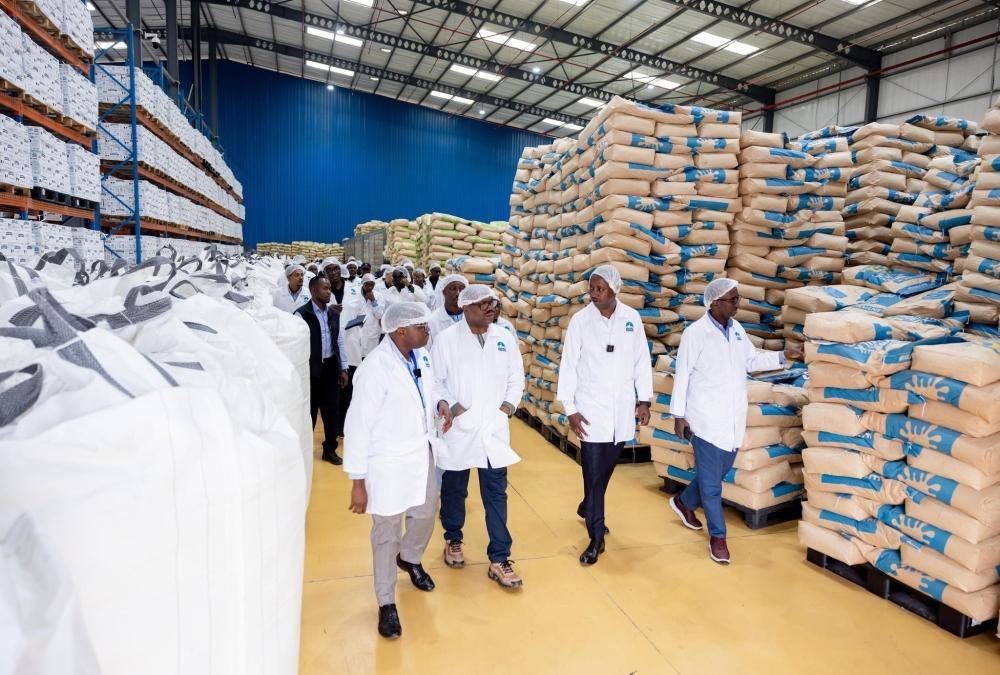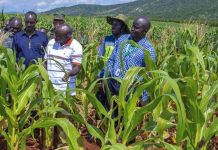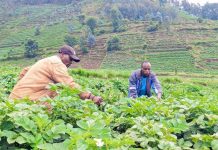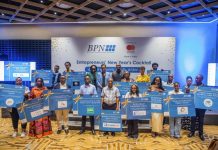Africa-Press – Rwanda. Two new industrial parks under development in Nyagatare and Nyabihu districts will be exclusively dedicated to agro-processing and integrated with circular economy models to convert industrial waste into valuable resources, according to the Ministry of Trade and Industry (MINICOM).
The new industrial policy, to be implemented from 2024 to 2034, identifies priority sectors to accelerate industrialisation, with agro-processing being one of them.
Fred Mugabe, Industrial Policy Analyst at the Ministry of Trade and Industry, said that establishing agro-processing industrial parks would significantly contribute to implementing the policy.
“We are creating specialised industrial parks specifically for agri-food industries in locations such as Nyagatare and Nyabihu. These parks will be exclusively dedicated to agri-food enterprises,” he said.
Approximately 80 per cent of industries in Rwanda’s industrial parks are operational, with the remainder at various stages of development, according to the Ministry of Trade and Industry (MINICOM).
Nyabihu Industrial Park, covering 50 hectares and focused on agro-processing, is currently in the third stage of land expropriation. Nyagatare Industrial Park, also dedicated to agro-processing, is at the engineering design stage.
By 2050, industrial zones in Nyabihu are expected to occupy 143 hectares, according to the Rwanda Housing Authority (RHA). Nyagatare District’s industrial park spans 50 hectares, with plans to expand industrial zones in the district to 605 hectares by 2050.
The Ministry of Trade and Industry is collaborating with the United Nations Industrial Development Organization (UNIDO) to conduct feasibility studies for agro-processing industrial parks in Nyabihu and Nyagatare.
Agro-processing opportunities
Agro-processing industries in Nyagatare District—such as milling, dairy processing, and fruit preservation—are in high demand due to the strong market potential of local agricultural products.
Located in the Eastern Province’s cattle corridor, Nyagatare offers prime investment opportunities in livestock farming, animal feed production, dairy, meat processing, poultry, aquaculture, horticulture, and cold chain infrastructure.
Investors can participate in projects like the Nyagatare Modern Slaughterhouse in Rutaraka Industrial Zone, the Nyagatare Maize Mill Factory, milk processing facilities, and the management of the Nyagatare modern market for agricultural and manufactured goods.
Nyabihu District is agriculturally productive, with residents growing cash crops such as pyrethrum, coffee, and tea, as well as food crops like Irish potatoes, maize, sorghum, beans, and vegetables including cabbages, carrots, and onions.
To enhance productivity, the policy emphasises modernising farming techniques and focusing on high-growth agricultural value chains.
Rwanda’s horticultural subsector shows strong potential for growth, particularly in exports, with key value chains including peppers, tomatoes, French beans, macadamia nuts, grapes, and passion fruit.
Additional agro-processing opportunities exist in downstream processing of jams, dried fruits, juices, and nuts.
Rwanda faces a substantial sugar import bill to support its local food and beverage manufacturing industries, which rely heavily on sugar as an ingredient.
Local production remains below 12%, insufficient to meet rising demand and the unpredictable competition from regional sugar markets.
Domestic sugar production offers economic, environmental, and strategic benefits that support food security, economic independence, and sustainability.
“To boost domestic sugar production, the government needs to make land available for sugarcane plantations, which are essential for supplying raw materials to factories,” the policy states.
Agro-processing industrial parks and the circular economy
A circular economy is an economic system designed to eliminate waste and maximise resource efficiency.
It follows the principles of “reduce, reuse, repair, remanufacture, and recycle.”
To promote green industrialisation and circular economy principles under the new policy, waste from sugar production is repurposed into electricity, organic fertilisers, animal feed, and other products.
This initiative aligns with the 10-year industrial policy running from 2024 to 2034, which also aims to establish waste management infrastructure in industrial parks, zones, and clusters by facilitating private investment and considering public-private partnerships
To promote the circular economy, the policy recommends incubating ventures such as the conversion of food waste into carbon-negative fertiliser, among other innovations.
According to Mugabe, the policy enables industrial parks to interconnect, develop, and share best practices aligned with circular economy principles.
He noted that agro-processing industries generate waste that must be recycled into useful products.
“The new industrial policy was recently adopted to promote green industrialisation and the circular economy,” he said. “It also embraces the growing need for green industrialisation and the development of circular economies and low-carbon value chains,” reads part of the policy.
Jean Pierre Niyigena, an entrepreneur in the food processing industry, supports the concept of agro-processing industrial parks backed by policy promoting green industrialisation and circular economy development.
He founded a company called “Triumvirate,” which produces sambaza fish flour—a protein-rich, shelf-stable food ideal for young children—and transforms by-products and food waste into valuable resources.
“We purchased drying and grinding equipment to produce high-quality fish powder. We’ve expanded from 200 kg per day to a one-tonne daily capacity. My business follows post-harvest processing, ensuring no fish goes to waste.
Water used in processing is collected and given to pig farmers. Fish heads and other residues are sold as animal feed, creating a secondary revenue stream. By adopting circular economy principles, I reduce waste and maximise value from raw materials,” he explained.
Susan Chomba, Director of Vital Landscapes for Africa at the World Resources Institute (WRI), argues that circularity can promote sustainable development, address climate change, and tackle challenges in food systems—particularly food loss and waste.
“Technical support helps SMEs innovate and repurpose waste into valuable products. Some SMEs use technologies like the Black Soldier Fly, which turns organic farm waste into organic fertiliser and protein-rich larvae for livestock feed. Rwanda’s experience has inspired knowledge exchange with Kenya and Ethiopia. There is a stronger policy environment and political will supporting circularity,” she noted.
She added that integrating circular principles into policy is commendable.
“Rwanda leads in policy reform; other countries still need to translate policy ideas into practical actions.”
For More News And Analysis About Rwanda Follow Africa-Press






